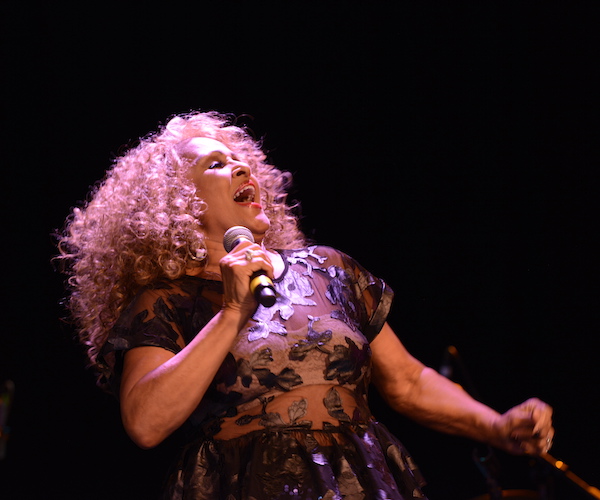Music Review: Singer Darlene Love — At 74 She is Just Getting Started
What came through strongest was Darlene Love’s pride in having a new album out and a comeback underway.

Darlene Love at The Cabot. Photo: Eric Antoniou.
By Brett Milano
There are a few good reasons to love Darlene Love. Everybody appreciates a survivor, and Love not only survived working in the ‘60s with the volatile Phil Spector, but a few decades’ worth of lean years afterward. Along with her still-mighty voice, Sunday’s sold-out show at Beverly’s Cabot Theater displayed the underlying toughness that’s kept her in the game. As she mentioned a few times, she successfully sued Spector to get royalties on a number of records where she’d sung uncredited. “Phil was mad about that,” she noted. “But look where I am now, and look where he is.”
But whatever you think of Spector (who is now serving time on a murder charge), he and Love made some real art together. Love was the voice on “He’s a Rebel” (credited to the Crystals, who didn’t actually appear), one of the quintessential teen melodramas. And she got to sing the two best songs on Spector’s 1963 Christmas album, “Marshmallow World” and “Christmas (Baby Please Come Home)”—the latter a perennial contender for the best rock & roll Christmas song. David Letterman obviously thought so, having Love perform the song annually on his show for more than two decades.
That song was the finale of her Cabot show, which included a few Christmas songs, a bunch of Spector oldies, and a surprising amount of new material. It would be an exaggeration to say that her voice is absolutely intact after 50 years—she’s lost a bit of upper range, and “Christmas” had to be dropped a couple keys—but it’s impressively close, and she still belts it out forcefully. Toward show’s end she aired another gripe concerning Spector: He’d earmarked Love to be the lead singer on “River Deep—Mountain High,” arguably his greatest production of all; but when she turned up at the studio she found Tina Turner there instead (“I knew she wasn’t there to sing background,” Love noted). She then reclaimed the song by singing a full-throttle version; something that Turner, who largely retired after a 2008 tour, hasn’t been able to do in years.
It was also the rare show by a veteran artist that focused on new material—a dozen songs’ worth, nearly the entirety of her recent comeback album Introducing Darlene Love (released in September on CBS). Produced by Springsteen guitarist and garage-rock honcho Little Steven Van Zandt, the album gives her the royal treatment, with custom-written songs by Bruce Springsteen, Elvis Costello, Jim Webb, and others. Everyone stepped up well for the occasion: Webb’s “Who Under Heaven” plays like a sequel to his own “MacArthur Park” (complete with long instrumental interlude); Costello’s “Forbidden Nights” is the kind of sparkling pop song he’s largely stopped writing for himself. As for Springsteen, he never needed any excuses to do a Spector homage; his song “Night Closing In” could have fit equally comfortably on a 1963 Spector single or on The River. Each of these songs references the Spector Wall of Sound, and she had a big enough band onstage to pull it off.
Unlike her ‘60s bad-girl counterpart Ronnie Spector, Love always had more of a wholesome image—hence a couple of gospel songs in Sunday’s set. What came through strongest was her pride in having a new album out and a comeback underway; she even promised a few times to be back next year. It’s a kick to see a 74-year-old artist who really believes she’s just getting started—especially when she just might be right.
Brett Milano has been covering music in Boston for decades, and is the author of Vinyl Junkies: Adventures in Record Collecting (St. Martins, 2001) and The Sound of Our Town: A History of Boston Rock & Roll (Commonwealth Editions, 2007). He recently returned from New Orleans where he was editor of the music and culture magazine OffBeat. His latest book is Don’t All Thank Me At Once (125 Records), a biography of the unsung pop genius Scott Miller, who led the bands Game Theory and The Loud Family.

Such a loving review, Brett, I wish I’d been there.